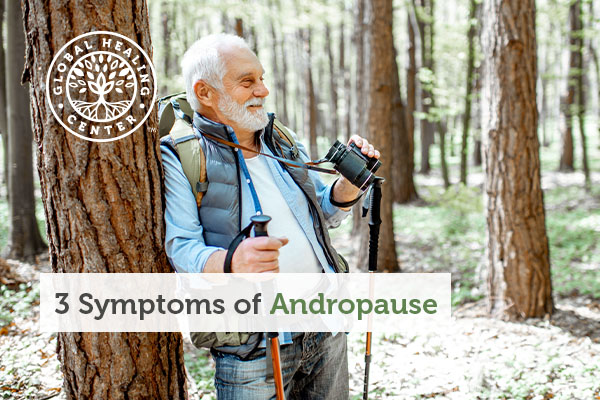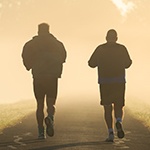
As men age, their bodies produce less testosterone. Because testosterone supports so many of the processes in a man's body, big changes occur when it's in short supply. "Andropause" (or "male menopause") is the term given to the overall process and symptoms that occur when testosterone levels decline. Andropause affects millions of men worldwide and is a common part of aging.
Top 3 Symptoms of Andropause
1. The Physical Symptoms of Andropause
Physically, andropause has been described as being akin to puberty, but in reverse. Testosterone is responsible for regulating bone and muscle growth. Both of those diminish when testosterone is less available. The Wesley Woods Health Center in Atlanta warns that men experiencing the symptoms of andropause have a higher risk of osteoporosis. [1]
Additionally, body fat increases and lean body mass decreases, this can quickly become a very imbalanced scale. According to the University of Texas School of Medicine, body mass and testosterone may be inversely related and obesity restricts testosterone production. When testosterone production is already affected, this can make a strained situation even worse and might offer an explanation as to why obesity affects older men. [2]
2. Sexual Symptoms of Andropause
Testosterone is required for sexual function but testosterone is less available during andropause. Uh-oh. You're probably not surprised to learn that many men report experiencing impotence and other sexual concerns such as premature ejaculation, or no ejaculation at all. [3]
When the Department of Family Practice & Community Medicine at the University of Texas surveyed 302 andropause patients, erectile dysfunction was at the top of the list of reported symptoms. [4] It's worth underscoring the fact that erectile dysfunction often coexists with cardiovascular concerns and depression. Both of which have a horrible and compound effect on the quality of life for the man experiencing the symptoms and his partner; it's an important point to remember (and certainly one that's hard to forget) when two people are affected.
3. Cognitive Symptoms of Andropause
A survey of 85 men between the ages of 40 and 65 years reported that the most frequent mental changes associated with andropause were reduced concentration and memory, and increased irritability. [5] Studies by the Psychology Department at King's College in London have indicated disturbed sleep (due to hot flashes and night sweats) contributed to fatigue and irritability. [6] Additionally, anxiety, mood swings, and nervousness are also common. [7] What's the explanation? According to the University of Texas Medical School in Houston, there is strong evidence that testosterone helps protect against neurodegeneration. When testosterone is less available, so is that protection. [8]
What Can Be Done About Andropause?
Different men experience the symptoms of andropause differently. There are men over 70 who do not experience any of the above symptoms. There are men in their 40s who experience all of them. It is known that type 2 diabetes and obesity make men more prone to low testosterone, so can certain medications. Alcohol consumption and neglecting to exercise can negatively affect testosterone levels.
While many doctors recommend hormone replacement therapy, not all men are convinced about its long-term safety and prefer to address the concern with non-pharmaceutical methods. One of the best natural defenses against andropause is to simply keep your body in shape. For many men, the severity of andropause symptoms is directly related to their overall fitness. Get your diet in check, stick to an exercise plan, take supplements that support your body, and avoid the bad habits like smoking or excessive drinking that worsen andropause symptoms.
References (8)
- Tenover JS. Prevalence and management of mild hypogonadism: introduction. Int J Impot Res. 2003 Aug;15 Suppl 4:S1-2.
- Tan RS, Pu SJ. Impact of obesity on hypogonadism in the andropause. Int J Androl. 2002 Aug;25(4):195-201. Review.
- de Lignières B. [Andropause and its management in the aged male]. Presse Med. 2002 Nov 23;31(37 Pt 1):1750-9. Review. French.
- Tan RS. Memory loss as a reported symptom of andropause. Arch Androl. 2001 Nov-Dec;47(3):185-9.
- Seikowski K, Stöbe K, Harth W. [Midlife crisis in men? Subjectively perceived physical and mental changes in men of advancing age]. MMW Fortschr Med. 2008 Jan 17;149 Suppl 4:132-6. German.
- Grunfeld EA, Halliday A, Martin P, Drudge-Coates L. Andropause syndrome in men treated for metastatic prostate cancer: a qualitative study of the impact of symptoms. Cancer Nurs. 2012 Jan-Feb;35(1):63-9. doi: 10.1097/NCC.0b013e318211fa92.
- Delhez M, Hansenne M, Legros JJ. [Testosterone and depression in men aged over 50 years. Andropause and psychopathology: minimal systemic work-up]. Ann Endocrinol (Paris). 2003 Apr;64(2):162-9. Review. French.
- Tan RS, Pu SJ, Culberson JW. Role of androgens in mild cognitive impairment and possible interventions during andropause. Med Hypotheses. 2003 Mar;60(3):448-52.
†Results may vary. Information and statements made are for education purposes and are not intended to replace the advice of your doctor. If you have a severe medical condition or health concern, see your physician.







